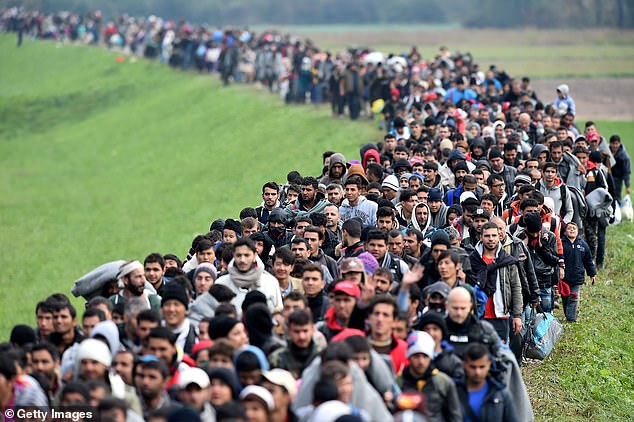The EU is planning to overhaul a postwar policy that forces nations to take in asylum seekers.
The 1951 Refugee Convention, established after the Second World War and updated with rulings by European and EU courts, was created in ‘a very different geopolitical situation to that of today’, according to a diplomatic paper seen by the Times.
The convention signed by 144 countries includes the principle of non-refoulement, which states that no asylum seeker can be forced to return to a country where their life or freedom could be seriously threatened.
But this principle has been criticised as not fit for purpose as millions of asylum seekers have requested refugee status in European countries in the last ten years while countries struggled to return those who failed the bid.
Currently, there are only limits on the application for refugee status in ‘extraordinary situations’, which didn’t take the ‘challenges’ faced by EU governments into account, according to the report drafted by Poland.
The paper, which was discussed by EU interior ministers last week, came prior to proposals to speed up deporting failed asylum seekers as well as those involved in crime.
The report stated that some migrants do not integrate and form separate communities that ignore European values, which adds to the challenges faced by European countries.
Failed asylum seekers as well as refugees with permanent residence have been behind a wave of violent crimes and murders committed in European countries like Germany, but they were protected from deportation under the refugee laws.


There have been EU proposals of establishing centres outside of the EU for migrants waiting on a decision of their asylum application, but the convention is considered an obstacle.
Plans for new rules allowing deportations and repatriation centres outside the EU are due to be challenged as a breach of the convention in court.
Millions of migrants illegally entered into EU countries during the Syrian refugee crisis in 2015 as they looked to find asylum, with requests having remained high since.
Discontent with this has resulted in support of nationalist and radical populist parties all over Europe, which promise to combat the number of asylum seekers being allowed to stay in their countries.
In Germany, migration is one of the most important topics for voters in the upcoming elections this month as the hard-right Alternative for Germany (AfD) party gains momentum.
Conservative leader Friedrich Merz, who is expected to defeat Social Democrat Chancellor Olaf Scholz, has pushed for tough measures to turn away asylum seekers.
This has prompted anger from former Chancellor Angela Merkel, whose decision to open the borders to over one million first-time migrants in 2015 has been criticised by the right for triggering the migrant crisis.
‘I believe it is wrong,’ Merkel said, referring to the outcome of a vote in parliament last Wednesday when a CDU motion was passed with support from the nationalist AfD, breaking a long-held political taboo in Germany.

This comes as Sweden unveiled tough new requirements for citizenship as part of tighter immigration rules aimed at integrating migrants and upholding the country’s values.
The government said earlier this month that it wanted to toughen the rules for obtaining Swedish nationality, with a probe recommending ‘honest living’ as a prerequisite.
It also recommended extending the required duration of time spent in the country prior to obtaining citizenship – increasing to eight years from the current five.
Those seeking citizenship would also have to pass a test on Swedish society and values, and do a language exam, according to the government-ordered probe.
‘Citizenship must be earned, not be handed out unconditionally,’ Migration Minister Johan Forssell said in a post on Instagram.
Forssell told a press conference that citizenship also helped tie people of disparate backgrounds together under ‘a common Swedish identity’.
He said it was ‘crucial’ to ‘always be very clear about the values that must apply in Sweden’.
‘Family is important but it does not stand above the law. There is equality between the sexes. You can marry whoever you want.
‘Girls and boys have the right to swim and play football. If you don’t accept that, Sweden is not the country for you,’ the minister said.
